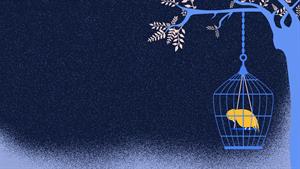
PUMPA - SMART LEARNING
எங்கள் ஆசிரியர்களுடன் 1-ஆன்-1 ஆலோசனை நேரத்தைப் பெறுங்கள். டாப்பர் ஆவதற்கு நாங்கள் பயிற்சி அளிப்போம்
Book Free DemoHow can the bird that is born for joy,
Sit in a cage and sing.
How can a child when fears annoy,
But droop his tender wing,
And forget his youthful spring.
Sit in a cage and sing.
How can a child when fears annoy,
But droop his tender wing,
And forget his youthful spring.
Explanation:
In the fourth stanza, the schoolboy raises a couple of rhetorical questions. The speaker begins the stanza with the question, “How can the bird that is born for joy sit in a cage and sing?” Here, he compares himself to a caged bird. A bird is meant to be free, and it should sing and fly as it wishes. However, when birds are caged, their very nature to fly and be free are snapped away from them.
Similarly, a child should be let free to explore and create. Unfortunately, schools stop the kids from being creative and imaginative. The schools are confinement to the kids as the cages are for the birds.
Schools are often associated with punishments and fear. As a result, the child's wings of imagination and possibilities are restrained, and he is made to forget his youthful spring.
In the stanza, bird and cage are used as metaphors for child and school, respectively.
Schools are often associated with punishments and fear. As a result, the child's wings of imagination and possibilities are restrained, and he is made to forget his youthful spring.
In the stanza, bird and cage are used as metaphors for child and school, respectively.

The speaker compares his plight to that of a caged bird
Meanings of difficult words:
S.No | Words | Meanings |
1 | Droop | To bend or hang down heavily |
2 | Tender | Young, inexperienced, or vulnerable; (of a plant) easily injured by severe weather or careless handling and therefore needing protection |
3 | Youthful | Characteristic of young people, or relating to the period of life when one is young |
4 | Spring | The season after winter and before summer, in which vegetation begins to appear; (metaphorically) relating to the period of life when one is young |
5 | Rhetorical question | A question asked in order to create a dramatic effect or to make a point rather than to get an answer |
Reference:
National Council of Educational Research and Training (2008). Honeydew. The School Boy-William Blake (pp. 83 - 84). Published at the Publication Division by the Secretary, National Council of Educational Research and Training, Sri Aurobindo Marg, New Delhi.